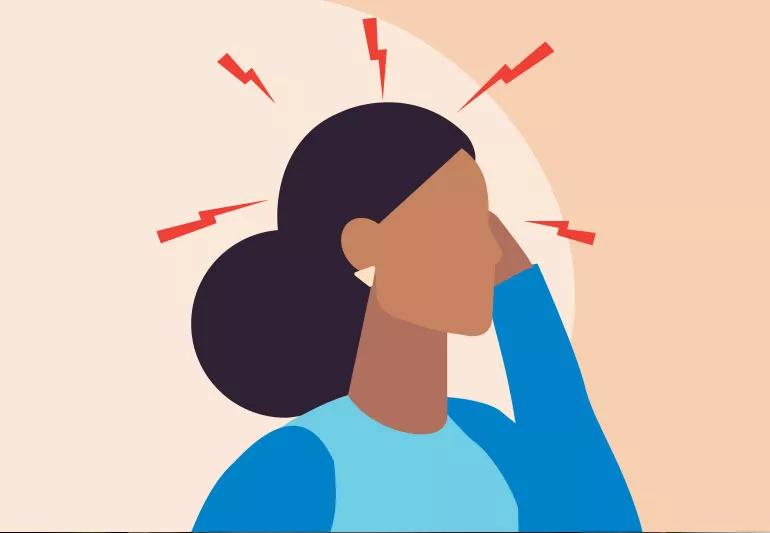This nerve-induced headache requires different treatment

Image content: This image is available to view online.
View image online (https://assets.clevelandclinic.org/transform/d4ea545b-b326-4430-b15d-a53210ad5eb8/OccipitalNeuralgia-1200787224-770x533-2_jpg)
woman with horrible headache
If migraine medication isn’t working, your recurring headaches may not be migraines after all.
Advertisement
Cleveland Clinic is a non-profit academic medical center. Advertising on our site helps support our mission. We do not endorse non-Cleveland Clinic products or services. Policy
Occipital neuralgia, a nerve-induced headache, can be confused with migraine because the symptoms can be similar. They include:
But that’s where the similarities end. Occipital neuralgia and migraines require different treatments because their sources of pain are different. Migraines are related to changes in the brain. Occipital neuralgia is due to compressed or irritated nerves that run from the neck, up the back of the head to the scalp.
“Nerves can become entrapped due to muscle spasms or head or neck trauma, such as whiplash,” says pain management specialist Shrif Costandi, MD. “Sometimes we don’t know what causes it.”
Migraines tend to have identifiable triggers, Dr. Costandi notes. They can be accompanied by visual disturbances and other symptoms that precede the headaches. Occipital neuralgia, on the other hand, does not typically have either of those characteristics.
Pain specialists can identify occipital neuralgia through one or more of these methods:
Advertisement
Taking oral anti-inflammatory medicines is the first step to treating occipital neuralgia. Using heat or massage to soothe tight neck muscles can help as well.
If those treatments don’t provide relief, interventional pain specialists can perform an occipital nerve block. That’s when a local anesthetic and steroid are injected around the irritated nerve.
“Pain relief can last from several weeks to several months, and sometimes the pain doesn’t come back,” says Dr. Costandi.
If your headaches have persisted for more than three months and have not responded to conventional treatments — including migraine medication — it’s time to see a doctor.
Advertisement

Delivered every Tuesday!
Sign up for our Health Essentials emails for expert guidance on nutrition, fitness, sleep, skin care and more
It's a letter about the news!

Every two weeks once
Sign up for our Health Essentials emails for expert guidance on nutrition, fitness, sleep, skin care and more.
Learn more about our editorial process.
Advertisement
Most recommended precautions center around minimizing bruising or swelling
Even one drink can have an impact on your cognitive function leading to slurred speech, blurred vision and impaired memory
Understand who may (and may not) benefit
Lorem ipsum dolor sit amet. Et odio Quis vel ipsam omnis eum alias deleniti et placeat impedit non voluptas galisum hic autem enim et cupiditate aliquid. Est beatae quidem non facilis autem ut commodi nisi aut tempore rerum et dolores voluptatem cum enim optio id sapiente quasi. Ad laboriosam officiis 33 cupiditate sequi ea voluptatum consectetur qui necessitatibus voluptate et quasi doloremque et facere explicabo quo explicabo officia
Seeking help through therapy can be an important step in improving your quality of life when you have UC
Type 2 diabetes isn’t inevitable with these dietary changes
Applying a hot or cold compress can help with pain
Pump up your iron intake with foods like tuna, tofu and turkey